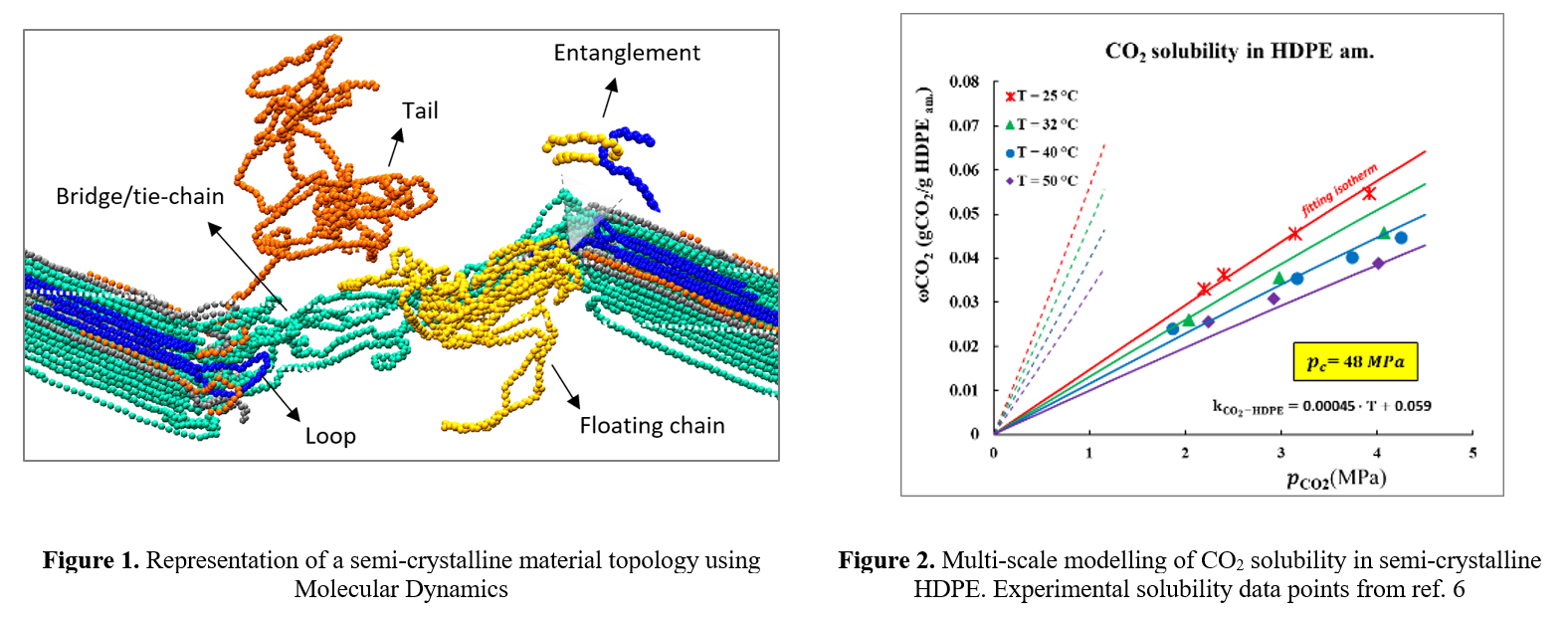2023 AIChE Annual Meeting
(647f) An Experimental and Theoretical Analysis of Hydrogen Sorption, Diffusion and Permeation in Semicrystalline Polymers
Authors
The potential of green hydrogen as sustainable energy carrier has boosted the interest for the development of safe and efficient system for its transport and storage. Metal pipelines and tanks indeed may be subjected to embrittlement and possible failure due to hydrogen diffusion. One solution to this issue is the use of high performance polymers to protect them against hydrogen penetration. Most such materials are semicrystalline, as crystal domains are impermeable to gases. The knowledge of gas diffusion in semicrystalline materials at moderate and high pressures however is very scarce, both at the experimental and modeling level. In this work, that involves different international groups and industrial partners, we address this problem comprehensively using theoretical models and experimental analysis. The aim is to obtain a reliable model which uses a few predictable parameters to design materials with desired performance, and introduce the innovation required for the hydrogen infrastructure.
Materials and Methods
The materials studied were High Density Polyethylene (HDPE) and Medium Density polyethylene (MDPE) with different crystallinity.
Modeling: a multiscale modelling platform was developed using Molecular Dynamics (MD) simulations to represent the polymeric structure at the atomistic scale and the Lattice Fluid Equation of State (LF EoS) 2 for the calculation of the phase equilibrium between the gas and the polymeric phase, which allows to evaluate the gas sorption in the material. An additional parameter is introduced to represent the constraint exerted by the crystal domains on the amorphous polymer phase (Figure 1).3 Simulations of diffusion are carried out using the same MD approach considered for gas solubility, and a Finite Volume model.
Experimental: A time-lag equipment (ASTM D1434) was used to determine diffusivity and permeability on the different samples at the University of Bologna. An analysis of the material structure was carried out via calorimetry and X-Ray at the Universidad Nacional del Sur.
Results and Discussion
Based on our preliminary analysis the multiscale approach for sorption agrees with existing literature data for several gases in HDPE, based on only one adjustable parameter, the constraint pressure pc, which expresses the constraining effect of the crystal phase on the amorphous one.4 Figure 2 shows the example of CO2 solubility in HDPE at different temperatures, modeled using the multiscale model for solubility and a pc value of 48 MPa.5 Future efforts will be devoted to predict this parameter based on a fully atomistic description of the semicrystalline system.
Hydrogen sorption and diffusion tests carried out at various temperatures and pressures through the time-lag instrument shows consistent trends and allow to understand the pressure and temperature dependencies, as well as the effect of the polymers crystallinity on their performance, thus providing a validation to the models developed.
Significance
A way to correlate the performance of materials for hydrogen handling to their molecular structure using simple macroscopic adjustable parameters was established, paving the way for the informed design of hydrogen-ready materials.
This research is part of the research program of the Dutch Polymer Institute (DPI), project 844: Modelling and Design of Multiphase Polymeric Materials for High Performance Applications Across Multiple Scales (MumPol).
References
- UK Hydrogen Strategy, 2021 gov.uk/official-documents
- Sanchez, I.C., Lacombe, R.H. Macromolecules. 1978, 11, 1145.
- Atiq, O., Ricci, E., Giacinti Baschetti, M., De Angelis, M.G. Fluid Phase Equilib. 2022, 556.
- Minelli, M., De Angelis, M.G. Fluid Phase Equilib. 2014, 367, 173.
- Atiq, O., Ricci, E., Giacinti Baschetti, M., De Angelis, M.G., Fluid Phase Equilib. 2023, submitted.
- Von Solms, N., Nielsen, J.K., Hassager, O. Rubin, A., Dandekar, A.Y., Andersen, S.I., Stenby, E.H. Appl. Polym. Sci. 2004, 91, 1476.

